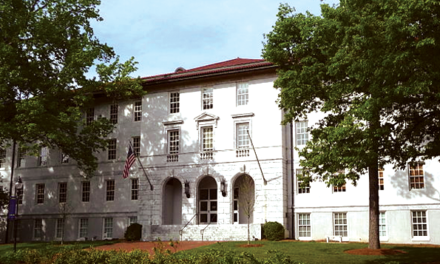The Student Government Association (SGA) voted unanimously to approve changes to the monetary code that update outdated language, institute contingency account caps for divisional councils and establish a new budgeting process for University-wide organizations (UWOs), in accordance with changes made to the Student Activities Fee (SAF) split bill passed in December.
The monetary code outlines the distribution of the SAF, which every student contributes $89 to through tuition. The SAF is allotted to each divisional council, like the BBA Council, and the UWOs, which are the Student Programming Council (SPC), the Media Council, the Outdoor Emory Organization (OEO) and Club Sports. The code also grants duties and responsibilities to SGA and organizational and divisional treasurers.
Some of these monetary code updates resulted from the bill passed in December that eliminated fixed percentages allotted to UWOs through the fee split, according to full-time MBA Goizueta Business School student and SGA Governance Committee Chair David Kaplan.
The SGA Finance Committee, which is made up of SGA legislators and the treasurers of UWOs and divisional councils, developed the changes to the code. A separate committee made up of legislators and some divisional council presidents and treasurers determined the UWO budgeting process, which is in section five of the monetary code.
Under the old system, UWOs received a certain fixed percentage in the fee split. Kaplan said the reason it doesn’t make sense for UWOs to receive a fixed percentage is because they are essentially University-wide clubs that answer to SGA, whereas divisional councils like the Graduate SGA or BBA Council represent certain populations of students. Divisional councils receive a percentage of the fee split based on how many students they represent.
Under the new system, the money that UWOs receive in the fee split will start off in a general UWO account. Then, they must apply for funding from this account through the budgeting process annually in the spring semester, which will determine their operating budget for the following school year.
The budgeting process involves presenting a detailed projected budget for the year to SGA, including major events they want to host and line-items for specific expenses that must be based on past events they’ve hosted.
The process also allows UWOs to build in miscellaneous funds, Kaplan said.
“All we’re adding here is the same type of oversight that any club at any level in this community goes through to get budgets,” Kaplan said.
Other chartered organizations, like the Indian Cultural Exchange (ICE) and TEDx, must first present a line-item budget to the SGA Finance Committee. After the Finance Committee approves it, the SGA Legislature must approve it in two consecutive meetings.
According to Kaplan, these changes were made because SGA business managers, who have seen multiple waves of leadership pass through these organizations, have reported that many UWO leaders copy and paste the previous year’s budget without updating it.
“The goal is not to micro-manage UWOs,” Kaplan said.
Kaplan added that the committee to make these changes included representation from every part of the University.
B-school senior and BBA Council President Patrick McBride wrote in an email to the Wheel that his objectives going into the negotiations were met.
“I am satisfied with the outcome of this bill, especially in the way SGA handled themselves in light of their behavior on the UWO/fee split debacle,” McBride said, referring to the bill passed in December.
In addition to the budgeting process, the monetary code establishes new contingency account caps for the divisional councils. Contingency accounts accumulate the unspent funds given to student organizations from their operational budgets. The new code maintains this rule but caps the amount of money in the contingency accounts of divisions “to prevent long-term accumulation of funds at the divisional level,” according to the monetary code.
Moreover, Kaplan said he believes this is necessary because currently student organizations are underspending the money they are allotted. He said he believes the contingency caps will deter future leaders from underspending.
“There are plenty of examples of divisions in certain years who just underspend, which robs their current students of activities that they’ve paid for,” Kaplan said. “When you roll [the money] over, you’re stealing from current students to subsidize future students.”
According to College senior and SGA Finance Committee Chair Calvin Lee, to date a total of $1.1 million dollars have rolled over into contingency accounts for all UWOs and divisional councils, with the exception of Oxford.
The contingency caps are different for every division based on the number of students in the division, the size of the contingency account and the history of roll-overs for the division, according to Kaplan.
Lee added that these caps were determined by representatives from SGA in consultation with divisional council and UWO leaders.
Because current contingency accounts contain more than the determined caps, each division has three years starting in the fall of 2014 to spend down their contingency accounts to meet the cap.
In regards to the contingency caps, McBride wrote that he still questions the need for them.
The bill states that excess funds that exceed the contingency caps will be transferred to the SGA Fee Interest Account, which is used for long-term projects that last three or more years.
In addition to the changes in the SAF split, Kaplan said the monetary code was due for an update in order to change language that was outdated and align policies with practice.
For example, last semester the Legislature restructured the chartering process to eliminate the categories of perpetual and temporary charters, Kaplan said. The new monetary code no longer has this language.
The code also establishes that the SGA Vice President for Finance is in charge of setting the deadlines for the organizational and UWO budgeting processes.
The code is available on the SGA website.
– By Rupsha Basu
The Emory Wheel was founded in 1919 and is currently the only independent, student-run newspaper of Emory University. The Wheel publishes weekly on Wednesdays during the academic year, except during University holidays and scheduled publication intermissions.
The Wheel is financially and editorially independent from the University. All of its content is generated by the Wheel’s more than 100 student staff members and contributing writers, and its printing costs are covered by profits from self-generated advertising sales.






